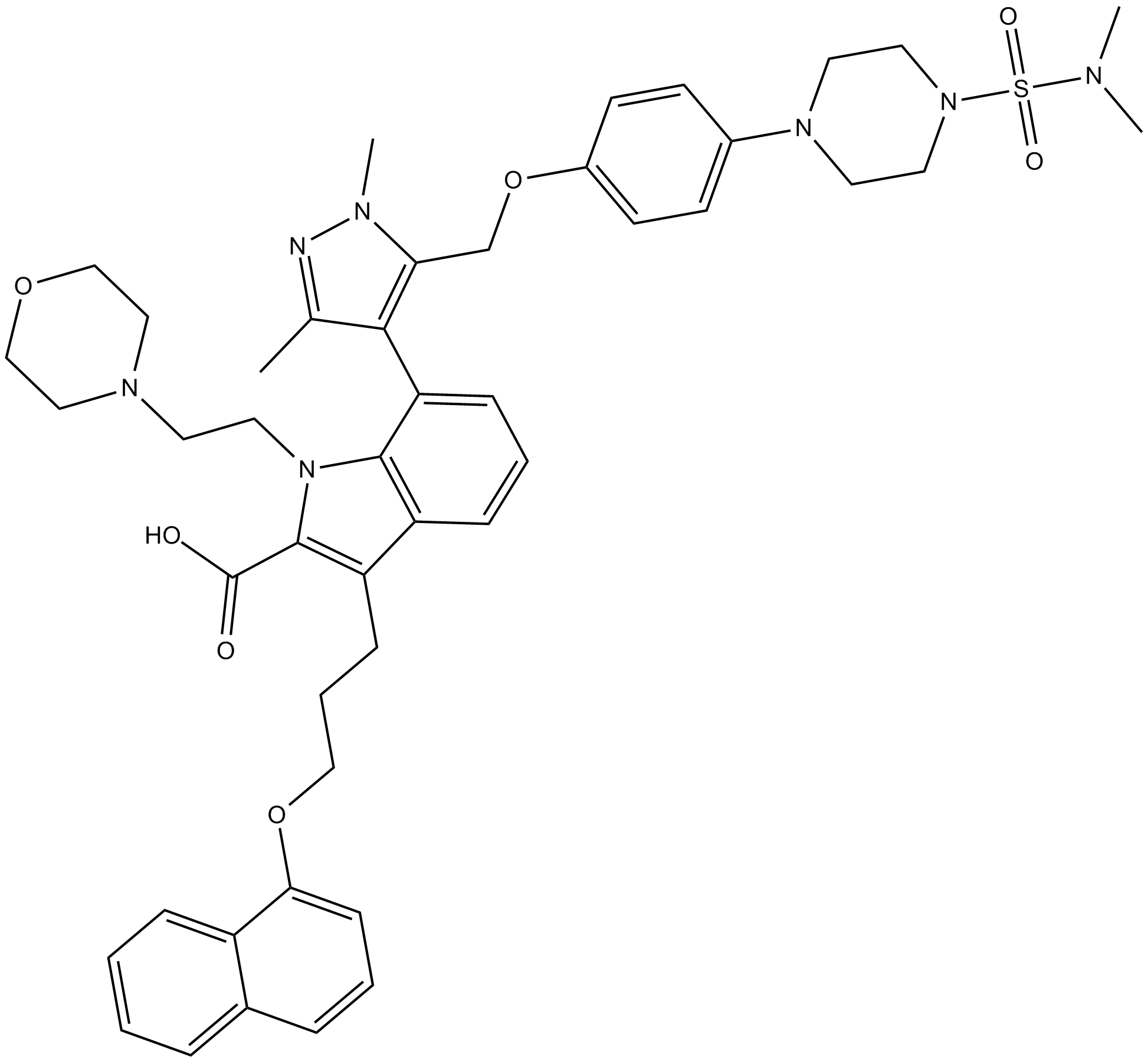A-1210477 |
| Katalog-Nr.GC16278 |
A-1210477 ist ein potenter und selektiver Inhibitor von MCL-1 mit einem Ki von 0,45 nM. A-1210477 bindet spezifisch MCL-1 und fÖrdert die Apoptose von Krebszellen auf MCL-1-abhÄngige Weise.
Products are for research use only. Not for human use. We do not sell to patients.

Cas No.: 1668553-26-1
Sample solution is provided at 25 µL, 10mM.
A-1210477 is an effective and specific MCL-1 inhibitor with an EC50 value below 5 µmol/L [1]. Selectively, it binds to MCL-1 with an affinity of 0.45 nM [2].
MCL-1, an anti-apoptotic Bcl-2 family member, is an anti-apoptotic protein. It is a key regulator of cancer cell survival [3, 4].
In MCL-1-dependent SVEC cells, treatment with A-1210477 at varying doses, induced cell death in a dose-dependent manner. SYTOX Green exclusion and live-cell imaging were used to determine cell viability. In line with increased potency, cell death was more rapidly induced by A-1210477. To examine the selectivity of A-1210477 for targeting Bcl-2 family members, BcL-xL-, BcL-2-, and MCL-1-dependent SVEC cells were treated with A-1210477. A-1210477 only killed MCL-1-dependent cells. Compared with UMI-77, A-1210477 showed greater potency and specificity as an MCL-1 inhibitor, the EC50 value of UMI-77 is 10 µmol/L [1]. In living cells, A-1210477 disrupted BIM/MCL-1 complexes. In MCL-1-dependent cancer cells, A-1210477 induced the hallmarks of mitochondrial apoptosis. In various malignant cell lines, A-1210477 induced apoptosis, synergizing with navitoclax. Data also demonstrate that A-1210477 acted through an on-target mechanism. It appeared as the first BH3 mimetic targeting MCL-1 [2].
The pharmacokinetics of A-1210477 are not favorable for in vivo use [5].
References:
[1]. Lopez J, Bessou M, Riley JS, et al. Mito-priming as a method to engineer Bcl-2 addiction. Nature communications, 2016, 7:10538.
[2]. Besbes S, Mirshahi M, Pocard M, et al. New dimension in therapeutic targeting of BCL-2 family proteins. Oncotarget, 2015, 6(15): 12862.
[3]. Leverson JD, Zhang H, Chen J, et al. Potent and selective small-molecule MCL-1 inhibitors demonstrate on-target cancer cell killing activity as single agents and in combination with ABT-263 (navitoclax). Cell death & disease, 2015, 6(1): e1590.
[4]. Mott JL, Kobayashi S, Bronk SF, et al. mir-29 regulates Mcl-1 protein expression and apoptosis. Oncogene, 2007, 26(42): 6133-6140.
[5]. Opferman JT. Attacking cancer's Achilles heel: antagonism of anti-apoptotic BCL-2 family members. FEBS Journal, 2015.
Average Rating: 5 (Based on Reviews and 17 reference(s) in Google Scholar.)
GLPBIO products are for RESEARCH USE ONLY. Please make sure your review or question is research based.
Required fields are marked with *




















